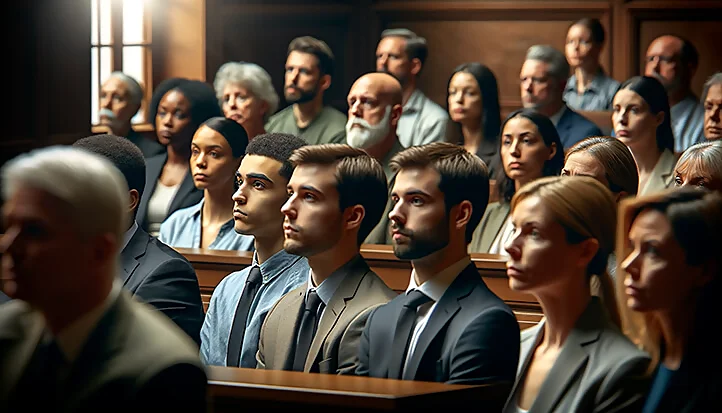Legal psychology is a branch of psychology that deals with the study of psychological aspects and processes related to law and the legal system. It covers the examination of psychological factors that influence the behavior of participants in judicial proceedings, including judges, lawyers, victims, witnesses, and criminals.
Legal psychology also explores methods of psychological expertise and evaluation applied in legal proceedings and investigates the psychological aspects of legislation and law enforcement. This discipline helps to understand how psychological theories and methods can be used to improve the legal system and ensure justice.
Legal psychology began to develop as a separate discipline in the late 19th and early 20th centuries. The main impetus for its formation came from the realization of the importance of psychological factors in justice. One of the first significant contributions to this field was the research of Gustav Aschaffenburg, published in 1908, where he discussed the psychopathology of crime. In the 20th century, interest in psychology in the legal sphere increased, particularly in the context of witness testimony evaluation and psychological assessments of criminals. During this period, the first foundations of forensic psychology began to take shape.
After World War II, legal psychology developed further. A crucial stage was the introduction of psychological knowledge into judicial practice and criminal investigation. Researchers began to study more closely the influence of psychological factors on the decision-making process in legal matters, including biases and perception errors.
By the end of the 20th century, the field of legal psychology had significantly expanded, covering topics such as the psychology of witness testimony, interrogations, lying and deception, as well as psychological counseling within the legal system. During this period, ethical standards and professional guidelines for psychologists working in the legal field also began to emerge.
In the 21st century, legal psychology continues to evolve, integrating the latest research and technologies, such as neuropsychology and digital analysis methods, to improve justice practices and enhance the efficiency of the legal system. This discipline is now an essential part of education in law and psychology faculties worldwide.
Legal psychology plays an important role in modern society as it provides an understanding of the psychological aspects related to law and legal processes. The importance of this discipline lies in the following:
- Improvement of judicial processes. Legal psychology helps to understand the motives and behavior of criminals, witnesses, and victims, contributing to more accurate and fair trials.
- Support for justice. Psychological knowledge is applied to analyze witness testimonies, assess their credibility, and understand the impact of biases and stereotypes on the decision-making of judges and juries.
- Development of policy and legislation. Understanding the psychological aspects of social behavior and crime helps develop more effective laws and social programs aimed at crime prevention and the rehabilitation of offenders.
- Ethical aspects. Legal psychology contributes to the formation of ethical standards in law enforcement practice, helping to ensure respect for the rights and dignity of all participants in legal processes.
- Education and training. Legal psychology is important for the education of lawyers and judges, especially in the aspects of communication psychology, understanding human behavior, and applying psychological knowledge in legal practice.
- Prevention and rehabilitation. Psychological research in this area helps to better understand the causes of criminal behavior, which aids in the development of effective programs for crime prevention and the rehabilitation of offenders.
Thus, legal psychology makes a significant contribution to the development of a more just and efficient legal system, as well as to the protection of human rights and freedoms in society.

Main Directions and Tasks of Legal Psychology
Legal psychology, occupying a unique position at the intersection of law and psychology, plays a crucial role in understanding and solving various legal issues. It explores the complex relationships between psychological processes and legal procedures, providing valuable insights into the mechanisms of justice.
In the field of legal psychology, special attention is given to analyzing behavior and mental states both in the context of committing crimes and in the process of judicial proceedings. It covers a wide range of tasks—from understanding the motives behind criminal behavior to assessing the reliability of witness testimony and the psychological preparation of legal professionals.
In the face of increasingly complex legal cases and societal changes, legal psychology provides the necessary knowledge to adapt and evolve the legal system. This enables more effective responses to new challenges, ensuring justice and the protection of rights at all levels of public life.
This area is constantly evolving, responding to the changing social, legal, and technological conditions of the modern world. Therefore, understanding the main directions and tasks of legal psychology is key for any specialist seeking a deep comprehension of the legal system and its interaction with the human factor.
Psychology in Legislation
Psychology in legislation influences the process of creating, interpreting, and applying laws. It helps understand how various psychological factors can affect legislative processes and decisions, as well as how people perceive and comply with laws.
- Understanding human motivation and behavior: Psychology assists lawmakers in understanding people’s motivations and behaviors. This knowledge can be used to develop more effective and fair laws that take into account human characteristics and social realities. For example, understanding the factors that contribute to criminal behavior can lead to the creation of laws aimed at reducing these factors, rather than merely punishing crimes.
- Analyzing the impact of laws on society: Psychological research can help analyze the impact of laws on society. By studying how people respond to specific legislative initiatives, laws can be adapted and modified to become more effective and less burdensome for society.
- Influence on the interpretation of laws: Psychology plays a role in how laws are interpreted. Judges and lawyers, by understanding the psychological aspects of witness testimony, motives, and behavior, can more accurately interpret legal norms and make fair decisions.
- Relation between law and public opinion: Psychology is essential for understanding and improving the relationship between law and public opinion. Laws perceived as unjust or inadequate can provoke public discontent or resistance, while laws based on a deep understanding of human psychology will contribute to social order and justice.
Thus, the integration of psychological knowledge into the legislative process is essential for creating effective and fair legal regulation in modern society.
Psychology in Judicial Proceedings
Psychology in judicial proceedings plays a key role, influencing all aspects of the legal system—from investigation processes to the delivery of a verdict. It helps understand the behavior and motives of all participants in the judicial process, including witnesses, criminals, victims, lawyers, prosecutors, and judges.
- Evaluating witness testimony: Psychology assists in analyzing the reliability and credibility of witness testimonies. Studying the memory, attention, and perception of witnesses allows identifying potential distortions and errors in their statements.
- Psychological assessment and evaluation: Legal psychologists may be involved in conducting psychological assessments of suspects to evaluate their mental state, the presence or absence of mental disorders, as well as their ability to perceive reality and take responsibility for their actions.
- Psychological aspects of decision-making by judges and juries: Understanding the psychology of decision-making helps reveal how biases, stereotypes, and emotional factors can influence judicial decisions. This includes studying group dynamics among jurors and the influence of moral and ethical beliefs on the judicial process.
- Psychological training of legal professionals: Psychological education is crucial for lawyers and prosecutors so they can effectively interact with clients, witnesses, and the court, and understand the psychological aspects of their own defense and prosecution strategies.
- Support for victims and witnesses: Psychological assistance to crime victims and witnesses enables them to cope with trauma and stress associated with participating in court proceedings, ensuring their emotional stability and ability to provide adequate testimony.
- Rehabilitation and correction of offenders: Psychology is also used to develop rehabilitation programs and social adaptation strategies for convicts, aimed at reducing recidivism and enhancing their ability to reintegrate into society after serving their sentences.
Psychology in Criminal Investigations and Criminology
Psychology in criminal investigations provides tools and methods for understanding criminal behavior as well as for conducting effective investigations and crime prevention.
- Criminal profiling: Psychological profiling helps create detailed portraits of unknown criminals based on the characteristics of the crimes they commit. This includes analyzing motives, behavioral patterns, and the socio-psychological background of offenders.
- Understanding criminal behavior: Psychology aids in investigating the causes and factors contributing to criminal behavior, including social, economic, biological, and psychological aspects. This understanding is crucial for developing crime prevention strategies.
- Interrogations and the psychology of deception: Knowledge in the field of deception psychology is applied during interrogations, helping law enforcement officers identify false statements and obtain reliable information from suspects and witnesses.
- Psychological support for victims: Providing adequate psychological support to crime victims contributes to their recovery and facilitates the collection of reliable testimony for investigations.
- Rehabilitation of offenders: Psychology plays a role in the development and implementation of offender rehabilitation programs, aimed at reducing recidivism and ensuring social adaptation after serving sentences.
- Training law enforcement personnel: Psychological knowledge is used to train police officers and investigators, helping them better understand human behavior and interact effectively with different categories of people.
Psychology in criminal investigations and criminology is an integral part of the modern criminal justice system, helping improve both crime investigation processes and measures to prevent crimes.
Psychology in the Execution of Punishments and Rehabilitation
Psychology in the execution of punishments and rehabilitation focuses on improving the processes of correction and social adaptation of offenders, as well as reducing recidivism.
- Psychological assessment: Psychological evaluations are conducted to determine the psychological profile of the offender and identify their needs for psychological assistance and rehabilitation. This is essential for developing individualized correctional programs.
- Rehabilitation programs: Psychologists develop and conduct specialized programs aimed at changing offenders’ behavior and thinking, teaching social adaptation skills, anger management, overcoming addictions, and other aspects necessary for successful reintegration into society.
- Support during imprisonment: Psychologists provide support to inmates during their sentences, helping them cope with the difficulties of imprisonment, maintain mental health, and prepare for life outside the correctional facility.
- Psychotherapy and counseling: Individual and group psychotherapy is used to treat psychological disorders, process traumatic experiences, and develop constructive behavior strategies.
- Work with offenders’ families: Psychological assistance to the families of offenders helps maintain and strengthen family ties, which is important for rehabilitation and social adaptation after release.
- Research and evaluation of programs: Psychologists conduct research to evaluate the effectiveness of rehabilitation programs and make adjustments for their improvement.
As you can see, psychology not only contributes to improving the conditions of serving sentences but also plays a significant role in preparing offenders for successful social adaptation and preventing future crimes.

Research Methods in Legal Psychology
Research methods in legal psychology represent a unique combination of techniques and approaches that allow for a deeper understanding of human behavior within the context of the legal system, enriching both theoretical and practical aspects of legal psychology.
Researchers focus on a wide range of issues, from analyzing the psychological aspects of criminal behavior to the influence of psychological factors on legal decision-making processes. The diversity of methodologies applied in legal psychology allows for a comprehensive study of these issues, providing valuable data and insights that can impact the development of laws, judicial practice, and justice policy.
Highlighting research methods opens the door to the world of legal psychology, demonstrating how the precision of scientific research can be successfully applied to solve specific legal challenges. From experimental research to qualitative analyses, each method contributes to the development of this multifaceted and important field of knowledge.
Research methods in legal psychology not only reveal the deep psychological processes underlying the legal system but also provide practical tools for improving justice and law enforcement.
Experimental Methods
Experimental methods in legal psychology are central to studying human behavior within the context of law and justice. These methods allow for a scientific examination of how various factors influence people’s behavior in legal situations, providing controlled and systematic conditions to obtain reliable data.
The key element of the experimental method is the manipulation of one or more variables, while the researcher actively controls other factors to precisely determine causal relationships. For example, an experiment can be conducted to study how the presentation of evidence affects jury decisions, with one group receiving information visually and another in written form.
Experimental methods also include laboratory experiments where participants are placed in a controlled environment to simulate legal processes or situations. This allows for studying behavior in artificially created conditions, closely resembling real courtroom scenarios.
The use of experimental methods in legal psychology also encompasses field experiments, where research is conducted in real legal contexts, such as court hearings or police interrogations. This provides data that more accurately reflects real human behavior.
Moreover, experimental methods may involve the use of modern technologies, such as virtual reality or neurobiological response analysis, for a deeper understanding of psychological processes related to law and justice.
Surveys and Interviews
Surveys and interviews are important methods of data collection in legal psychology, allowing for the gathering of detailed information on people’s views, opinions, perceptions, and personal experiences in the context of law and justice. These methods provide opportunities to study a wide range of issues related to legal processes, attitudes toward laws, and the psychological aspects of interaction with the legal system.
- Surveys are usually structured sets of questions aimed at collecting quantitative data from a large number of respondents. They can be conducted in written form, online, or in person. Surveys are effective for assessing general trends and patterns in relation to certain legal issues, such as public opinion on legislation, levels of trust in justice, or attitudes toward various aspects of the criminal process.
- Interviews, unlike surveys, provide deep insights into individual views and opinions. Interviews can be unstructured, semi-structured, or structured and are often conducted in person. This method allows researchers to explore participants’ motivations, feelings, and opinions in more detail, offering a way to analyze complex psychological processes and nuances that may be missed in more formalized surveys.
Surveys and interviews are particularly valuable in studies related to understanding witness behavior, attitudes toward crime and punishment, the influence of psychological factors on decision-making by judges and juries, and the perception and relationship with law enforcement and the judicial system.
Case Law Analysis
Case law analysis in legal psychology is a thorough study of decisions made in various legal proceedings to understand how psychological factors influence justice. This method involves examining court records, decisions, witness testimonies, arguments from prosecution and defense, as well as the behavior and decisions of judges and juries.
The main goal of case law analysis is to identify patterns, trends, and psychological aspects that may affect judicial decisions and case outcomes. This may include examining how evidence is presented and perceived, analyzing the decision-making process of judges and juries, and understanding the influence of different types of witness testimony.
A key aspect is also studying how social, cultural, and psychological factors, such as biases, stereotypes, and social dynamics, can influence the course of legal proceedings and their outcomes. This includes analyzing cases where systemic problems may have arisen, such as prosecutorial misconduct or misapplication of laws.
Case law analysis can also shed light on the effectiveness and fairness of various legal procedures and practices, offering valuable recommendations for their improvement. For instance, this might involve questions related to witness questioning, the presentation of charges, or conducting psychological evaluations.
Case Method and Precedent Analysis
The case method and precedent analysis in legal psychology are approaches focused on studying specific legal cases and decisions to understand the influence of psychological factors on justice. These methods are based on a detailed examination of individual cases, their circumstances, and the decisions made, with the aim of identifying key psychological elements and trends in legal practice.
- The case method involves an in-depth analysis of individual legal cases. This may include examining the psychological profiles of defendants, the interactions between the participants in the legal process, such as judges, lawyers, and juries, and their influence on the outcome of the case. Special attention is given to the motives, beliefs, and behavior of all participants in the process.
- Precedent analysis in legal psychology focuses on studying previously made legal decisions and their consequences. The goal is to understand how past legal decisions have influenced subsequent legal practice and legislation, as well as to identify the psychological aspects that may have influenced these decisions.
Both of these methods allow for the examination of how factors like biases, social perceptions, and psychological pressures affect the process of legal decision-making. They also help identify patterns in decisions that may indicate the need for changes in the legal system or approaches to training legal professionals.
The use of the case method and precedent analysis in legal psychology enriches the understanding of how legal principles and psychological mechanisms intersect and interact in real legal practice, providing valuable lessons and directions for future research and practical applications.

Psychological Aspects of Legal Decision-Making
Legal decision-making is a complex procedure where legal norms intersect with human psychology. Every decision made by a judge, lawyer, or juror carries the imprint of various psychological processes. These processes encompass a wide range of factors, from individual cognitive characteristics to the influence of social and cultural contexts.
Understanding the psychological aspects that affect legal decision-making is key to comprehending how judicial conclusions and decisions are formed. This includes the study of cognitive biases, emotional influence, group pressure, and many other psychological factors that can affect the decision-making process in a legal context.
The importance of psychology in legal decision-making is particularly evident in situations where objectivity and fairness must be achieved, and where psychological factors can inadvertently distort the perception of evidence or the evaluation of facts. From understanding how witness memory works to recognizing biases in decision-making, each element plays its role in shaping the final legal judgment.
The Psychology of Judges and Judicial Decision-Making
The psychology of judges and judicial decision-making is an area that studies how personal beliefs, psychological states, and cognitive processes influence the decisions made by judges. This aspect of legal psychology is particularly important because judges are responsible for the fair and objective consideration of cases and the issuance of rulings.
Judges, like all people, are subject to various psychological factors that can affect their judgments. This includes biases, stereotypes, emotional states, and cognitive distortions. For example, confirmation bias can lead a judge to seek or pay more attention to information that confirms their initial impressions of the case or the defendant.
Additionally, the decision-making process of a judge can be influenced by factors such as public pressure, media, or other legal bodies. This pressure can create additional stress and affect the objectivity and independence of judicial decisions.
Emotional factors are also important. Although judges strive for objectivity, they cannot fully isolate themselves from personal emotional reactions to cases, especially in instances involving serious crimes or moral issues.
It is also important to consider the impact of fatigue and workload. Studies show that fatigue can reduce critical thinking ability and increase the tendency to opt for simpler and less time-consuming solutions.
Understanding and accounting for all these psychological aspects are crucial to ensuring fairness and effectiveness in judicial decisions. This knowledge aids in the development of strategies and training programs for judges aimed at minimizing the influence of unwanted psychological factors and maintaining a high level of objectivity and fairness in legal proceedings.
Psychological Factors in the Behavior of Lawyers and Prosecutors
Psychological factors play a significant role in the behavior of lawyers and prosecutors, influencing how they perceive cases, interact with clients, witnesses, and judges, as well as how they formulate their defense or prosecution strategies.
- Professional beliefs and values. Personal beliefs and values of lawyers and prosecutors can significantly affect their approach to a case. For example, a deep respect for law and justice may influence their pursuit of an objective outcome.
- Cognitive biases. Lawyers and prosecutors, like all people, are susceptible to cognitive biases. This may include confirmation bias, where they tend to seek, interpret, and remember information in ways that confirm their own views or case theories.
- Stress and emotional management. The high level of stress associated with meeting client interests and time pressure can affect the psychological state and behavior of lawyers and prosecutors. The ability to manage their own emotions and stress is a key skill for effective work.
- Social perception and interaction. The ability of lawyers and prosecutors to understand and predict the behavior and reactions of others (e.g., judges, jurors, witnesses) is an important aspect of their work. This includes skills in social perception, empathy, and interaction building.
- Ethical considerations. Ethical dilemmas faced by lawyers and prosecutors can cause psychological conflicts. Balancing duties to the client, the court, and personal moral principles can be difficult to maintain.
- Motivation and personal ambition also play a role in behavior and decision-making. For example, the desire for career advancement or recognition can influence how lawyers and prosecutors handle a case.
Understanding these psychological aspects helps in forming more effective case strategies, as well as in developing professional training and support programs for legal professionals across various fields.
The Influence of Biases and Stereotypes on Judicial Decisions
The influence of biases and stereotypes on judicial decisions poses a significant issue in justice, as it can distort the objectivity and fairness of decisions made within the legal system.
- Unconscious biases. Even the most experienced and educated judges and jury members can be subject to unconscious biases that affect their perception of the case and its participants. These biases are often based on gender, race, age, social status, nationality, or other factors.
- Stereotypes represent simplified and generalized views of groups of people. In the context of judicial proceedings, stereotypes can lead to unfair assumptions about the character, behavior, or motives of defendants, witnesses, or even victims.
- Impact on decision-making. Biases and stereotypes can influence the evaluation of evidence, the decision of guilt or innocence, and the choice of punishment.
- Consequences for fairness. The presence of biases and stereotypes can lead to an unjust trial, where decisions are made not based on an objective analysis of facts, but under the influence of personal beliefs and generalized views.
The influence of biases and stereotypes on judicial decisions is a serious issue that requires attention and conscious efforts to ensure fairness and equality in justice. It is important to recognize and actively combat biases and stereotypes within the judicial system. This includes training judges and jurors to understand and manage their biases, as well as developing procedures and practices that foster more objective case consideration.

Legal Psychology in Criminal Law
Legal psychology in criminal law occupies a unique niche, combining deep knowledge of human behavior and psychological mechanisms with the nuances of criminal justice. In this field, psychology intersects with law, creating a unique area for research, practical application, and development. It helps address complex issues related to the causes of criminal behavior, the psychology of witnesses, and the perception and evaluation of evidence.
In criminal law, every case, every trial is not only a legal procedure but also a complex human story where psychology plays a key role. From understanding the motives of the offender to the influence of psychological states on the decision-making processes of judges and juries, every aspect of criminal law is infused with psychological themes and questions.
This area encompasses the study of the influence of psychological factors on the behavior of criminals, the investigation process, and court proceedings. It is essential to understand how psychological research helps solve crimes, protect the rights of the accused, and ensure the fairness of judicial processes.
Legal psychology in criminal law serves as a bridge between psychological science and legal practice, providing a deeper understanding of how criminal justice operates in the context of human behavior and psychology.
Psychological Profile of a Criminal
The psychological profile of a criminal is a complex and multifaceted concept that encompasses a wide range of psychological characteristics, behavioral traits, and socio-biographical data associated with offenders. This aspect is important both for understanding the motives behind the crime and for developing effective methods of investigation and rehabilitation.
- Psychological characteristics include personality traits such as aggressiveness, impulsivity, emotional regulation disorders, antisocial behavior, and risk-taking tendencies. Mental disorders or pathologies may also be considered.
- Behavioral patterns. Analyzing behavioral models involves studying past crimes, behavior during the crime, and post-crime behavior. This can provide key insights into the offender’s thought processes and actions.
- Biographical factors. The criminal’s life history, including family background, education, socio-economic conditions, and history of illnesses or injuries, is also crucial for understanding factors contributing to criminal behavior.
- Motives and goals. Understanding the motives behind the crime, whether financial, emotional, social, or psychological, is key to creating an accurate psychological profile.
- Interpersonal interactions of the criminal with others, including victims, family members, and friends, may reveal important aspects of their psychology.
- Response to stress and conflict situations. The ways in which the criminal reacts to stressful or conflict situations can provide information about their psychological resilience and coping strategies.
A psychological profile of a criminal not only aids law enforcement agencies in investigating and profiling offenders but also plays a key role in developing strategies for their rehabilitation and preventing repeat offenses. This multifaceted understanding of the psychology of the criminal is fundamental to the development of an effective criminal justice system.
Psychology of Witnesses and Victims
The psychology of witnesses and victims plays a critically important role in the legal process, as their testimonies and reactions can significantly affect the outcome of a case. This aspect of legal psychology includes understanding how various psychological factors influence the ability of witnesses and victims to recall information, perceive events, and present them in court.
- Memory and recollection. The psychology of memory is fundamental to understanding how witnesses and victims remember and recall information about the crime. Stress, fear, and psychological trauma can distort or limit memories, which is important to consider when evaluating the reliability of testimony.
- The impact of stress and trauma. Experiencing traumatic events as a crime victim can affect their psychological state. This includes post-traumatic stress reactions, which may distort the accuracy and detail of recollections.
- Psychological pressure in court. Witnesses and victims often experience significant psychological pressure while testifying in court, which can impact their ability to accurately convey information. Nervousness, fear of responsibility, or fear of the offender can influence their behavior and words.
- Perception and interpretation of events. Psychological factors, such as biases, perception, and attention, can affect how witnesses perceive and interpret the events of a crime. Different witnesses may perceive the same event differently due to their individual psychological characteristics.
- Interrogation techniques. The methods by which witnesses and victims are questioned also reflect on their testimony. Poorly conducted questioning can lead to distortion or the creation of false memories.
Understanding the psychology of witnesses and victims helps law enforcement agencies and lawyers work effectively with testimonies, provide support to victims and witnesses, and increase the accuracy and fairness of judicial processes.
Psychological Expertise and Its Importance in Criminal Cases
Psychological expertise in criminal cases plays a fundamental role, providing the court with key information about the mental state of the participants, including the accused, witnesses, and victims. Expertise helps determine the ability of individuals to perceive, comprehend, or control their actions at the time of the crime, as well as assess their psychological state in a broader context.
- Assessment of the accused’s mental state. One of the key tasks of psychological expertise is to assess the mental state of the accused at the time of the crime. This includes determining their ability to understand the significance of their actions and control them, which is directly related to issues of sanity and responsibility.
- Understanding motives and behavior. Expertise can help identify the motives behind the crime and the psychological factors that may have contributed to its commission. This is important for understanding the nature of the crime and determining the most effective rehabilitation methods.
- Impact on witnesses and victims. Expertise can also be aimed at assessing the impact of the crime on the mental state of witnesses and victims, including issues related to trauma, stress, and the psychological impact of events.
- Criminal profiling. In some cases, expertise is used to create a psychological profile of an unknown offender, which can help in their capture and prevent further crimes.
- Assessment of recidivism risk. Psychological expertise can also assess the risk of repeat offenses, which is important for sentencing decisions, prison conditions, and rehabilitation measures.
Psychological expertise provides the court with critically important information, helping make well-informed and fair decisions in criminal cases. It contributes to a deep understanding of human behavior and mental states in the context of offenses, which is key to ensuring effective and fair justice.

Legal Psychology in Family and Civil Law
Legal psychology in family and civil law encompasses a wide range of issues related to human behavior and psychological processes within the context of personal and civil relationships. This field examines how psychological factors influence the dynamics of family relationships, divorce processes, child custody, as well as other aspects of civil law, such as inheritance cases, contracts, and civil lawsuits.
In family law, special attention is given to the psychological aspects of interactions between family members, the impact of conflicts and divorce on both children and adults, and the role of psychological expertise in custody and adoption matters. Understanding the emotional and psychological processes occurring in families is crucial for effectively resolving family legal issues.
In civil law, legal psychology is applied to analyze and understand human behavior in the context of civil transactions, including matters related to contractual relationships, liability, and compensations. This includes studying the psychological factors affecting decision-making and understanding the psychological consequences of legal disputes for participants.
Overall, the role of legal psychology in family and civil law goes beyond legal procedures, encompassing a deep understanding of human psychology, which allows for more effective conflict resolution and prevention of long-term negative consequences for all parties involved.
Resolving Family Conflicts
Resolving family conflicts in the context of legal psychology involves a comprehensive approach that includes an understanding of both legal aspects and the psychological factors affecting family members. This process not only covers legal procedures but also aims at ensuring the psychological well-being of all participants.
- Psychological analysis of conflict situations. This includes assessing the emotional state of conflict participants, their motives, fears, and expectations. Understanding these aspects helps in finding the most suitable ways to resolve issues.
- Mediation and arbitration. Applying mediation methods to facilitate dialogue between the parties. The mediator’s goal is to help conflict participants find a mutually acceptable solution that considers the interests of all sides.
- Family therapy. Sometimes resolving conflicts requires the involvement of a family psychologist, who works on improving relationships between family members, helping them understand each other better and find constructive ways of communication.
- Focus on children. In cases involving children, special attention is given to their well-being. This includes assessing the impact of the conflict on the child’s psychological state and developing strategies to minimize negative consequences.
- Development of individual strategies. Each family conflict is unique, and legal psychologists strive to develop individualized strategies that best fit the specific situation and needs of the participants.
- Legal support. An important part of the process is legal support aimed at ensuring that the solutions are legally justified and fair for all parties.
Thus, the role of legal psychology in resolving family conflicts is not only in the legal settlement of disputes but also in providing psychological support and finding optimal solutions to preserve the well-being and harmony in family relationships.
Psychology in Contractual Relations and Mediation
Psychology plays an important role in contractual relations and mediation, as successful negotiation and conflict resolution often depend on understanding the psychological aspects of the interaction between the parties. These processes take into account not only legal norms and provisions but also emotional, cognitive, and interpersonal factors.
- Understanding the motives and interests of the parties. A key aspect is identifying and understanding the true motives and interests of the parties involved in contractual relations or mediation. This helps find common ground and develop solutions that satisfy both sides.
- Communication skills. Effective communication, including active listening and clear expression of thoughts, is essential in the process of negotiation and mediation. It is important to express one’s views without triggering a defensive reaction from the other side.
- Emotion and stress management. Negotiations and mediation are often accompanied by high levels of stress and emotions. Understanding and managing one’s emotions, as well as the ability to recognize and appropriately respond to others’ emotions, is crucial for achieving a constructive result.
- Conflict resolution. In mediation, psychological knowledge is used to resolve conflicts by finding solutions that minimize friction and promote long-term cooperation between the parties.
- Decision-making. Understanding how people make decisions helps in formulating proposals and alternatives that will be acceptable to all parties. This includes considering cognitive biases and psychological barriers.
- Trust and relationships. Establishing trust between the parties is a key element of successful mediation and contractual relations. It is important to build positive relationships based on mutual understanding and respect.
Psychology in contractual relations and mediation plays a central role, helping the parties interact more effectively, understand each other, and find optimal solutions to complex issues and conflicts.
Psychological Aspects in Children’s and Adolescents’ Law
Psychological aspects in children’s and adolescents’ law are of great importance since children and adolescents differ from adults in their unique psychological, emotional, and cognitive characteristics. These aspects influence how they experience and respond to legal processes and decisions.
- Development and perception. Children and adolescents are at different stages of psychological and emotional development. Their ability to understand legal processes, the consequences of their actions, and the concept of justice is significantly different from that of adults.
- Impact on mental health. Legal processes and conflicts can have a significant impact on the mental health of children and adolescents. The stress associated with legal proceedings can lead to long-term emotional and psychological consequences.
- Considering the child’s best interests. In cases involving children, the primary priority is to protect their best interests. This includes ensuring their safety, well-being, and right to family relationships, as well as considering their opinions and desires in accordance with their age and maturity.
- Communication with children. Communicating with children in a legal context requires a special approach. It is important to consider their age, developmental level, and individual characteristics to ensure understanding and appropriate participation in the process.
- Rehabilitation and support. In cases where children become victims or witnesses of crimes, or when they commit criminal acts themselves, it is important to provide them with appropriate psychological support and rehabilitation.
- Specifics of legal proceedings involving children. Legal proceedings that involve children require procedural adaptations, taking into account their age and psychological characteristics, in order to minimize additional stress and avoid psychological trauma.

Ethical and Professional Standards in Forensic Psychology
Ethical and professional standards play a key role in the practice of forensic psychology, providing the foundation for appropriate behavior and activities of professionals in this field. In a world where psychology and law intersect, the importance of maintaining high ethical standards and professionalism cannot be overstated. These standards ensure the protection of the rights of clients and participants in legal proceedings, as well as uphold the integrity and effectiveness of the legal system.
Ethical standards in forensic psychology cover a wide range of issues, including confidentiality, informed consent, competence, honesty, and fairness. They serve as a guide for psychologists working in various legal contexts, from forensic evaluations to consultations and research.
Professional standards concern not only ethical aspects but also requirements for qualifications, training, and practical experience of specialists. They help define criteria for competence and provide a framework for assessing the professional activities of psychologists.
Another significant aspect of these standards is their role in protecting public welfare. Forensic psychologists often work with vulnerable groups and in situations where human rights and freedoms are at stake. Ethical and professional standards ensure that such work is carried out with due care, respect, and responsibility.
Overall, ethical and professional standards in forensic psychology serve as the foundation for trust in the profession and guarantee that psychological knowledge and skills are applied in the legal field in the best and most responsible way.
Ethical Dilemmas in Forensic Psychology
Ethical dilemmas in forensic psychology often arise from the complex intersection of professional duties, legal requirements, and moral considerations. These dilemmas can present significant challenges for psychologists working in the legal field, requiring them to balance between various ethical principles and practical considerations.
- Confidentiality vs. Duty to Report. Psychologists often face the dilemma of balancing client confidentiality with the duty to report potential threats to safety or crimes. It can be challenging to determine when disclosure of information is ethically justified.
- Dual Roles and Conflict of Interest. Forensic psychologists may find themselves in situations where their professional and personal interests conflict. For example, the work of a forensic psychologist may overlap with their research interests or personal beliefs.
- Competency and Insanity Evaluations. Psychologists are required to make complex assessments regarding the mental state and competence of clients, which can have serious legal and personal consequences for the individuals involved.
- Informed Consent. Obtaining informed consent in a legal context can be difficult, especially when clients are in vulnerable positions or do not fully understand the consequences of participating in psychological assessments or treatment.
- Fairness and Bias. Psychologists must confront their own biases and beliefs to ensure fair assessment and treatment of all clients, regardless of their background, gender, religion, social status, or nature of their crime.
- Responsibility and Pressure. Working in the legal field can come with significant pressure, as psychologists’ recommendations may determine the fate of individuals and the outcomes of legal cases.
Ethical dilemmas in forensic psychology require careful consideration of all aspects of each specific situation, as well as a commitment to professional standards and ethical codes. Resolving these dilemmas demands deep knowledge of ethics, law, and psychology, as well as the ability to critically analyze and reflect.
Professional Standards of Practice
Professional standards of practice in forensic psychology provide important guiding principles for psychologists. These standards are aimed at ensuring ethicality, competence, and fairness in their professional activities, which is especially crucial in a field where decisions often have profound and long-term consequences for people’s lives.
- Competence. In forensic psychology, this means not only having extensive knowledge of psychology but also an understanding of legal processes and terminology. Psychologists must continually improve their qualifications and stay informed about the latest research and practices in both fields.
- Ethical Behavior. Forensic psychologists must strictly adhere to ethical codes, respect confidentiality, avoid conflicts of interest, and act with maximum honesty and fairness.
- Objectivity and Impartiality. It is important to maintain objectivity when conducting evaluations and testifying in court, avoiding biases and prejudices.
- Informed Consent and Client Autonomy. Psychologists must ensure that their clients (or their legal representatives) fully understand the goals, methods, and potential consequences of psychological evaluations and interventions.
- Confidentiality and Privacy. Maintaining confidentiality and protecting clients’ personal data is a fundamental principle, especially in cases requiring court testimony or expert evaluations.
- Responsibility and Professional Development. Psychologists must take responsibility for the quality of their work, including maintaining professional competence, self-education, and analyzing their own practice.
Adherence to these standards of practice in forensic psychology is essential for maintaining the trust of clients and society, as well as ensuring fairness and effectiveness in the legal system.

Modern Challenges and Trends in Legal Psychology
Legal psychology is constantly facing new challenges and trends. In the era of globalization and technological progress, it adapts to the ever-changing landscape of social norms, which gives rise to new directions for research and practice.
One of the key topics is the integration of the latest technologies into legal practice and psychological expertise. From digital forensics to the use of artificial intelligence and virtual reality, technological innovations open up new horizons for understanding human behavior and judicial processes.
Moreover, changes in society’s social and cultural attitudes create new demands for understanding the psychological aspects of justice. Issues related to diversity, gender equality, and human rights are becoming increasingly important in the work of legal psychologists.
The rapidly changing social and political climate also gives rise to new types of crimes and legal challenges, such as cybercrime and transnational offenses, which require a rethinking of traditional approaches in legal psychology.
Additionally, there is a growing understanding of how psychological states influence decision-making, both in the context of criminals and judges, juries, and lawyers. This drives deeper research into cognitive biases, emotional factors, and socio-psychological dynamics in legal processes.
These challenges and trends contribute to the development of legal psychology as a science and practice, making it more relevant and necessary for modern society and its legal systems.
The Impact of Digital Technologies on Legal Psychology
Digital technologies have a significant impact on legal psychology, bringing new opportunities and challenges to practice and research in this field.
- Improved forensic assessments: Digital technologies enable more accurate and comprehensive forensic psychological assessments. For example, software for analyzing facial expressions and body language helps in evaluating the credibility of witness testimony.
- Big data analysis: Big data processing technologies allow for analyzing vast amounts of information, which is useful for identifying trends and patterns in criminal behavior, as well as for understanding common psychological factors influencing offenses.
- Digital modeling and virtual reality: The use of virtual reality to recreate courtroom scenes or crimes provides new ways to study the psychological impact and behavior of participants in the process, as well as helps witnesses better recall details of events.
- Internet and social media: Online communication and social media open new sources of information for psychological analysis. They are used to study the behavior and personal characteristics of individuals, which is important in the context of crime investigations and witness assessments.
- Electronic devices as evidence: Smartphones, computers, and other devices can contain valuable information, such as correspondence, geolocation data, and search history, which are used in legal cases to clarify the motives and behavior of those involved in the process.
- Cybercrime: The rise of cybercrime challenges legal psychology to study new types of criminal behavior, motives, and methods of committing crimes in the digital environment.
Digital technologies are radically transforming legal psychology, opening new horizons for research and practical application. However, they also introduce new requirements for specialists’ competencies and approaches to confidentiality and ethical issues.
International Aspects and Globalization of Legal Psychology
International aspects and globalization expand the boundaries of legal psychology, introducing new elements into practice and research. This expansion is driven by several factors:
- International cooperation in criminal justice: Globalization leads to an increase in international crimes such as terrorism, human trafficking, and cybercrime. This requires legal psychologists to understand the legal systems of various countries and methods of international cooperation.
- Cross-cultural research: Understanding psychological differences and similarities between cultures becomes important in the context of globalization. This helps adapt psychological assessment and treatment methods for multinational and multicultural societies.
- International judicial bodies: Working in international judicial bodies such as the International Criminal Court requires an understanding of global legal procedures and ethnic specificities.
- Knowledge sharing and best practices: Globalization fosters the spread of knowledge and best practices in legal psychology. This includes sharing research, theories, and methods through international conferences, seminars, and joint research projects.
- Standardization of professional practices: There is a trend towards harmonizing standards of practice and education in legal psychology on an international level, ensuring higher and more consistent levels of professional performance.
- Linguistic and legal differences: Professionals in legal psychology must be able to work in multilingual environments and understand legal differences between countries, which is a challenging task in the context of globalization.
Globalization and international aspects stimulate the development and adaptation of legal psychology, allowing it to respond more effectively to changing global conditions and the diversity of the international community.
The Future of Legal Psychology and New Research Directions
The future of legal psychology promises to be dynamic and innovative, considering current trends and technological development. New research will likely focus on the following areas:
- Digital technologies and artificial intelligence: The use of machine learning algorithms and artificial intelligence for data analysis in the legal sphere, including predicting behavioral trends and aiding investigations. This could also involve the development of tools for assessing witness credibility and detecting deception.
- Neuropsychology and jurisprudence: Research in neuroscience may provide new insights into how brain processes influence decision-making, moral judgments, and criminal behavior. This could lead to new methods for assessing and rehabilitating criminals.
- Cross-cultural research: Given globalization, it is important to study how cultural differences affect perceptions of law and justice. This can help develop more effective international legal strategies and policies.
- Psychology in the online space: With the rise of cybercrime and online activity, understanding the psychological aspects of online behavior, including bullying, fraud, and radicalization, is crucial.
- Human rights and social justice: Research in this area may focus on issues related to human rights, equality, and justice in legal processes, as well as the role of psychology in combating discrimination and inequality.
- Ethics and regulation: As new technologies and methods develop in legal psychology, there is a need to review ethical standards and regulate practices to ensure the protection of research participants’ and clients’ rights.
The future of legal psychology will be shaped by technological progress, social changes, and the ongoing pursuit of justice and efficiency in the legal system.

Conclusion
Legal psychology plays a key role in justice and society, providing unique insights into the complex interaction between psychological processes and legal procedures. It helps understand the psychological aspects of the behavior of both criminals and victims, and also influences the decision-making process of judges and jurors.
Legal psychology deepens the understanding of motives and behavioral mechanisms underlying criminal actions, which is important for developing effective prevention and rehabilitation measures.
In the courtroom, legal psychology assists in assessing the credibility and reliability of witness testimony and understanding the influence of various psychological factors on decision-making. This ensures fairer and more objective justice, reducing the risk of wrongful judgments and biases.
Moreover, legal psychology makes an important contribution to social justice by emphasizing human rights and ethical aspects in law enforcement. It helps protect the interests of vulnerable populations, including children, and in developing policies aimed at improving public safety and well-being.
Overall, legal psychology is a powerful tool for improving justice practices, providing a deep understanding of human behavior in the context of the law, and contributing to the development of a more humane and effective legal process.




